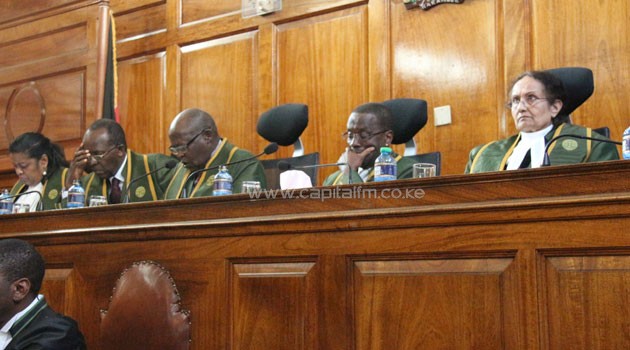NAIROBI, Kenya, Jan 28 – KTN, NTV, QTV and Citizen TV’s analogue signals in Nairobi will remain operational as the Supreme Court deliberates on whether they and the Communications Authority of Kenya (CA) have complied an order issued on September 29, 2014.
A judgment directing the two parties to, “discuss,” and agree on a digital migration deadline that would not contravene the June 17 international deadline to which Kenya is a signatory.
The parties were to report back within 90 days as per Chief Justice Willy Mutunga’s orders: “After 90 days please don’t come here telling us that you can’t sit and talk.”
That is however exactly what happened when the two parties appeared before the Supreme Court on Wednesday; accusing each other of approaching the talks in bad faith.
The television stations, represented by Senior Counsel Paul Muite, told the full seven-judge bench that the CA was frustrating its efforts to competitively compete on a digital platform by issuing them the court-ordered digital broadcasting license late, but by issuing them fewer frequencies than would be optimal and by ultimately withdrawing said frequencies.
“We applied to the CA for the license on October 1; just three days after you gave your judgment. They gave us a single UHF frequency for Nairobi on December 15. And then they announced that they would be switching off analogue signals in Nairobi on December 31 despite acknowledging to us in a letter that setting up the necessary infrastructure takes time. And I’m glad my learned friend has himself admitted that those frequencies are required when ordering for transmitters,” Muite told the court.
He said the three media houses had therefore lobbied the CA for a migration deadline of April 30 but given the delay occasioned by their disagreement, said May 30 would work best for them.
On their part the authority through lawyer Wambua Kilonzo told the court that the TV stations refused to discuss a digital migration deadline until they were issued a Broadcast Signal Distribution (BSD) license saying it would be akin to putting the cart before the horse.
“How can we reliably predict when we’ll be ready for our analogue signals to be switched off before we know we’ll be able to broadcast and on what frequencies our transmitters should be set?” Muite countered.
But according to the CA, the 21 frequencies the media houses had been allocated were sufficient and their demands for 35 more were not driven by a lack of sufficient signal strength but personal gain.
“In a response from S.K. Macharia (owner of Citizen TV) it is very clear that they are preparing their studios for High Definition Television which will set them apart from their competitors,” Kilonzo submitted.
He then went on to echo the Consumers Federation of Kenya in demanding that the Supreme Court set a definitive deadline for digital migration in order to avoid confusing consumers.
“This litigation has gone on for far too long. It really must come to a stop,” he submitted.
The Supreme Court is to give its ruling on notice.










































